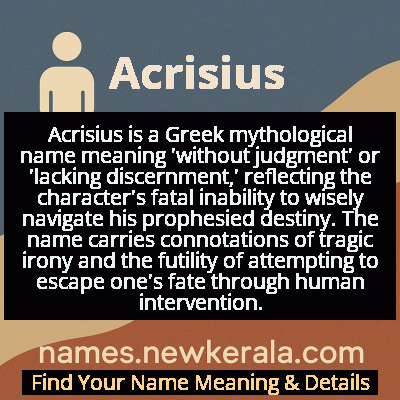Acrisius Name Meaning & Details
Origin, Popularity, Numerology Analysis & Name Meaning of Acrisius
Discover the origin, meaning, and cultural significance of the name ACRISIUS. Delve into its historical roots and explore the lasting impact it has had on communities and traditions.
Name
Acrisius
Gender
Male
Origin
Greek
Lucky Number
9
Meaning of the Name - Acrisius
Acrisius is a Greek mythological name meaning 'without judgment' or 'lacking discernment,' reflecting the character's fatal inability to wisely navigate his prophesied destiny. The name carries connotations of tragic irony and the futility of attempting to escape one's fate through human intervention.
Acrisius - Complete Numerology Analysis
Your Numerology Number
Based on Pythagorean Numerology System
Ruling Planet
Mars
Positive Nature
Generous, passionate, energetic, and humanitarian.
Negative Traits
Impulsive, impatient, moody, and can be overly emotional.
Lucky Colours
Red, maroon, scarlet.
Lucky Days
Tuesday.
Lucky Stones
Red coral, garnet.
Harmony Numbers
1, 2, 3, 6.
Best Suited Professions
Military, sports, philanthropy, leadership roles.
What People Like About You
Courage, energy, leadership, generosity.
Famous People Named Acrisius
Acrisius of Argos
Mythological King
Ruler of Argos whose attempt to avoid prophecy led to his death by his grandson Perseus
Acrisius (Literary Figure)
Mythological Character
Central tragic figure in the Perseus myth cycle representing the inescapability of fate
Acrisius (Academic Subject)
Mythological Archetype
Studied as exemplar of Greek concepts about prophecy and human limitation
Name Variations & International Equivalents
Click on blue names to explore their detailed meanings. Gray names with will be available soon.
Cultural & Historical Significance
The cultural impact of Acrisius extends beyond ancient mythology into modern psychological and literary analysis. His character represents the archetype of the 'fated king' whose attempts at control reveal deeper truths about human nature and destiny. In Renaissance art, Baroque opera, and contemporary retellings, Acrisius continues to symbolize the tension between free will and predestination. His story has been interpreted through various philosophical lenses, from Stoic acceptance to existential rebellion, making him a perpetual subject of cultural discourse about how we confront the unknown aspects of our futures.
Extended Personality Analysis
Individuals bearing the name Acrisius are often characterized by a complex blend of strategic foresight and underlying anxiety about uncontrollable forces. Like their mythological namesake, they tend to be meticulous planners who consider multiple potential outcomes, sometimes to the point of paralysis by analysis. This careful nature stems from a deep awareness of cause and effect, making them excellent at anticipating problems but potentially prone to over-preparation. Their personality often includes a philosophical dimension, as they grapple with questions of fate, choice, and the limits of human agency in shaping life's trajectory.
Despite their cautious exterior, those named Acrisius frequently possess intense inner lives marked by contemplation of larger existential questions. They may demonstrate remarkable resilience when facing inevitable challenges, having mentally prepared for various scenarios. However, this can also manifest as stubbornness or difficulty adapting when circumstances defy their expectations. Their relationships often involve complex dynamics around trust and control, as they navigate the balance between protecting themselves and others versus allowing natural developments to unfold. Ultimately, the Acrisius personality represents the eternal human negotiation between the desire for security and the acceptance of life's inherent uncertainties.
Modern Usage & Popularity
In contemporary naming practices, Acrisius remains an extraordinarily rare choice, primarily confined to academic circles, mythological enthusiasts, and literary contexts rather than mainstream usage. The name has never gained significant popularity in modern times due to its strong association with tragic fate and its complex mythological background. Current usage is mostly limited to character names in fantasy literature, classical studies references, or as a distinctive middle name for children in families with strong Greek heritage or classical education backgrounds. The name's decline in practical usage reflects broader cultural shifts away from overtly mythological names with negative connotations, though it maintains a niche appeal among those appreciating its historical depth and philosophical resonance. Digital era trends show occasional spikes in searches related to the name during periods when Greek mythology experiences renewed popular interest through film adaptations or educational initiatives.
Symbolic & Spiritual Meanings
Symbolically, Acrisius embodies the profound philosophical concept of predestination and the ironic ways human intervention can accelerate fated outcomes. The name represents the universal human experience of confronting prophecies or foreknowledge about one's future, and the psychological tension between acceptance and resistance. It serves as a metaphor for the limitations of control in human affairs, reminding us that our most elaborate precautions may inadvertently create the circumstances we seek to avoid. Acrisius also symbolizes intergenerational dynamics and the way ancestral decisions echo through family histories, particularly the complex relationship between grandfathers and grandsons. In psychological terms, the name represents the archetype of the 'resister of fate' - someone whose struggle against predetermined outcomes defines their character arc and ultimate tragedy. The symbolic resonance extends to modern discussions about free will, determinism, and how we navigate the boundary between shaping our destinies and accepting life's inevitable patterns.

